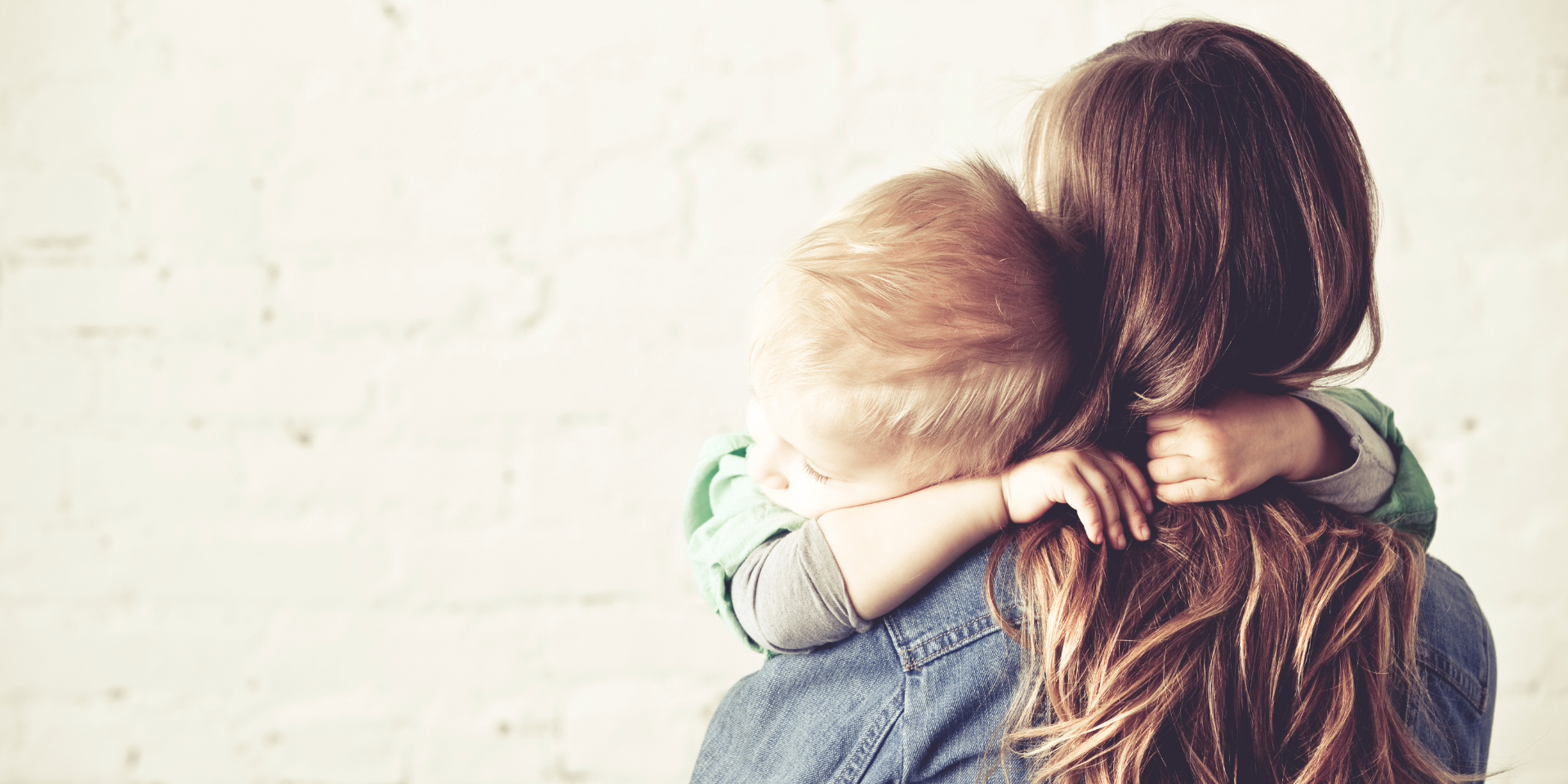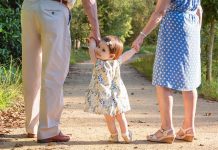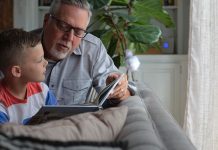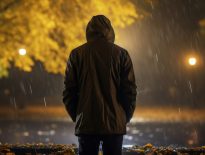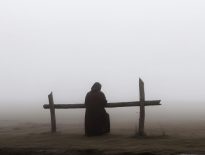My name is Rhonda (71). I have one son and two grandchildren.

What was it like when you first became a mother?
I think it’s overwhelming for any woman because you don’t know what’s ahead. I remember my mum warning me, “Rhonda, it’s not an easy path!” You hear it all, but it’s not until you experience it that you understand.
What’s been your favourite part?
All my son’s life was really good. My ex-husband and I split up when our son was only two years old. I was so glad I had a son because he helped me with the other side of things. He used to do everything he could to help me. When he grew up, he learnt to cook which was nice. One day he even burnt the kitchen down while frying chips on the stove. That memory will stick forever. [Laughs].
What was most helpful for you during those early years?
I went through a rough time with depression after my marriage ended. Just getting up in the morning was hard. It was like I had this robotic energy. To add to that, my son didn’t sleep for years and I was working nights at the time. But my sister and mum used to take him on weekends so I could get some sleep. Without their support, I don’t know how I would have survived.

If you could go back and tell young Rhonda something, what would you say?
Don’t take so much on yourself! I wanted to be perfect as a mother. I tried to be as a wife, but that didn’t work. We all try to be the best, but being perfect always requires more than we can give and leaves you feeling like you have nothing left in the tank for yourself.
Is there something you want to pass on to your grandchildren?
I think everyone needs to teach their children respect, reliability and responsibility. Values are a bit different these days. It’s all about me first and everyone else later.
How is life for you today?
I’m single and retired and can look around and say, “Wow, I’m happy where I am.” As you age, you really start to appreciate that you’re still here, because many haven’t made it. I always say to my son, “I’m so grateful to God to wake up each morning with my feet on the ground.” That’s a big thing for me, especially after having a stroke a few years ago.
My name is Mihaela (62). I have three children and two grandchildren.

Your granddaughters are only a few months old. How are you finding being a grandparent so far?
It’s better than being a parent! I think everyone will say that. You’re wiser and get more time with them.
What were things like for you when you first became a mum?
I had my three boys in Romania during communism. I had a cot, a pram and a milk bottle—that’s it. My in-laws would visit from Austria every now and then and bring a pack of nappies. They were so precious we’d save them for Saturdays.
Was that the most difficult period of parenting, during communism?
I think so. The country was drained and there wasn’t much for people to eat or buy. We had to queue for butter and milk and the shops only had a few things. Petrol was limited too, so we couldn’t go far.
My husband and I had to leave our three boys with their grandparents and go to Austria. We didn’t know when we’d see them again, but five months later, to our surprise, communism fell and we were reunited.
Why did you have to leave?
In Romania, they were making life very difficult for Christians. They started having school on Saturdays and made it compulsory for boys to join the army. I knew I couldn’t go through that with three boys. Even now when I think back to leaving them, my heart breaks. But it was the best decision for our family’s future. My sister-in-law lived in Austria, which is why they let us leave. First, my husband went over. Then I went by myself. Had we gone together with our boys, they wouldn’t have let us through. They would have known we wouldn’t go back to Romania.
Wow. Do you remember what it was like having your first child?
I had my first at 19. I didn’t tell my friends until I was showing, because I felt ashamed. I think it was the communism mentality. People were stressed about life. It was like they thought, You’re having too many children . . . times are already hard. I felt that shame with every child. I don’t think I even have a picture of being pregnant. And my husband didn’t get to see any of the boys be born because family wasn’t allowed in the hospital.
Were there any golden moments during that difficult time?
There were days we knew our aunties were visiting, and we’d make a special cake, boil the tea and get out the knitting needles. It was nice to have all the children—but it was also hard. Everything took time. We didn’t have hot water, we washed our clothes by hand, cooked everything from scratch.

Are there aspects of life in Romania that you’ve tried to hold onto within your family?
In Romania, everything was about talking to people—in the park, in the shops—it was all you had to do. We learnt everything from our mothers and grandmothers—that was the only way. Nowadays it is harder because our phones are with us everywhere.
Now you all live so close, yes?
Yes! My parents, some of my siblings and my three boys are in the same town. Each Friday night we all have dinner together. Every now and then, someone says to me, “Do you realise how lucky you are to have everyone so close to you?” I’m very fortunate. Maybe I did something right. [Laughs] . . . I don’t know.
What do you want to pass on to your children and grandchildren?
To do their best and to prioritise family. Even now, I’m looking at my windows thinking, “Ugh, they look disgusting.” But I either stay home and clean windows or I go spend time with my granddaughters.
My name is Dawn (77). I have three children and 10 grandchildren.

Your children are all grown up, but you’re still very much parenting.
Yes, when my son’s marriage separated, his kids moved away with their mum. I was devastated because I was really close with them. I cried for about six weeks and then out of the blue I got a call saying their mum wasn’t coping. So, two of my grandchildren came to live with my husband and me and we raised them. I was overjoyed to have them in my company again. One has since moved out, but we still have Jess, who is 25 and she has Down Syndrome.
Jess has such a big heart!
She does. Sometimes you have to give her a bit of time to do things, but she’s a good kid.
What is something you’ve tried to uphold in your family?
To love each other no matter what. In my family, nobody ever hugged you or said, “I love you.” I’ve tried to change that, as I never got that and always wished I did.
What does life look like now?
I do lots of gardening and look after my chickens. My goal is just to stay healthy and be here for Jess as long as I can.
My name is Gillian (70). I have four children, 12 grandchildren and two great-grandchildren.

You have a bit of a commune here.
Yes. We have one son on one side, another son up the hill and on the other side we have our daughter—and all their families, of course.
Did you always dream of living communally with your family?
I went to New Guinea on a surf trip when I was young and I felt at home in the village. Nobody was lonely. They did everything together. To me, the secret of raising children is to be with them. Children don’t care if you’re old or frail—they just want someone who is available.
What do you remember about first becoming a mother?
I was only 16 when I fell pregnant. But I loved it. I felt like this was my fit. I used to bathe my daughter a few times a day because I just liked looking after her. In those days, your only goal was to be a wife and mother.
Is there a memory you cherish with your children?
When you have a baby, there’s all this love in your heart for this tiny thing that really doesn’t bring anything except a lot more work, but you don’t want to be anywhere else. You can make their life like there’s no bad in the world. And you’re not going to spoil them with love at that age!
Did you have much support in those younger years?
No, my mum had 13 children and went through a nervous breakdown. I was the sixth child, so she was too busy when I was having children.

So, you did OK?
Well, not really. We lived with my husband’s parents and they were really hard on me. If my kids were in the bath and I was cooking dinner, [it meant] I wasn’t watching them which made me a bad mum. If I was watching them, [it meant] I wasn’t being a good wife and cooking dinner. I felt like I couldn’t do anything right. I remember one day crying to God, “I can’t please anyone . . . I get everything wrong.” Yet, I used to work so hard to get everything done. But I heard God say to me, “Gill, I’m pleased with you.” So, when my children do things I don’t agree with, I just try to love them. I don’t try to project anything they should be. God never did that to me.
What’s been important for you to teach your children?
Animals know they’ve got to raise their cub to be able to go out and survive. We don’t do that. We entertain them and make them selfish, lazy and entitled—we don’t teach them how to truly live. And I believe the happiest place is when you are giving. The happiest my grandson has ever been was when he was making me food, keeping me company and trying to help his grandma live.
What kinds of things do you like to do with your grandchildren?
We make origami creatures, go for walks in the bush, draw what we’re thankful for and we pray for other people, which encourages them to be interested in someone else’s life.
What advice do you have for other mums out there?
When I was young, I was surfing, I had four children and a nice home, but I wasn’t happy. Now, I can barely leave the house. I have terrible asthma and incredible pain. But my life is full of joy! There’s a beautiful quote I hold onto: “God has made ample provision for His children that if we rely on His strength, we will never be the spoil of circumstances.”
I love that.
I should say, I didn’t know all these things when I was younger. That’s why you have to be gentle on your children and grandchildren when they make mistakes.
My name is Cherry (63). I have four children and 11 grandchildren.
How did you find becoming a mum?
It was scary! The first baby was the most difficult because I didn’t know what I was doing. But I found my way, just taking one day at a time.
Do you have a favourite memory?
We used to play touch football together and our whole family was a team. It was a lot of fun!
Do you still play together now?
No, but we still get together every year and play lots of games. It’s the best. Nothing beats being together.

How has it been seeing your children become parents themselves?
Oh, fantastic. It can also be difficult because you want to offer advice, so they won’t have to experience all you had to. But they don’t always take it, so sometimes you have to watch them suffer the consequences. All you can do is tell them, “This is what worked for me.” It’s up to them to decide. They just need to know that you are backing them up and that you will support them no matter what.
What is life like for you now?
It’s nice to have freedom from the stress of being a parent. But it can also get lonely. Having a church family has been a huge blessing. Now my life is about trying to help those in our community. I’ve also been able to travel and that’s been really amazing. I just got back from a trip in Europe with my son and his children—travelling is exhausting with young children. I’d never do it . . . but they weren’t mine. [Laughs].
My name is Nerida (70). I have three children and 10 grandchildren.
What were your first impressions of becoming a mother?
It was the best thing! It’s almost a spiritual thing to have a baby. You know, it feels sacred. To have this bump, then suddenly a new life in your hands that you’re instantly in love with. It’s a sad thing that the men never get to fully experience it.
Which phase did you enjoy most?
When they’re babies, they can be so needy of you that it can be quite exhausting. When they’re toddlers, they’re of course so cute. But when they’re adults they become a friend. You become equals and you start looking up to them for things.

Your family has travelled a lot.
We spent a year travelling with the kids in a motorhome through Europe and the Middle East. After that, we lived and worked in Russia as missionaries for a few years before returning to Australia. We grew a lot together during our travels, explored so many cultures and met new people every day.
Do you think that’s why your family is so open and close?
We’ve tried to be big talkers with our kids. My parents weren’t good communicators. When my husband and I were courting, his mother would sit me down, give me a drink and a piece of cake, and ask all these questions to get to know me. I just loved that.
What do you hope to pass down?
I believe the biggest influence we can have on our family is to lead by example. We spent many years doing volunteer mission work and have taken some of our kids and grandkids on trips to help people in other countries. We’re very conscious of showing them the love of God, meaning we try to encourage them to love others and look outward, not inward.
Zanita Fletcher is a life coach and assistant editor for the Australia/New Zealand edition of Signs of the Times. She writes from the Gold Coast, Queensland. A version of this article first appeared on the Signs of the Times Australia/New Zealand website and is republished with permission.












